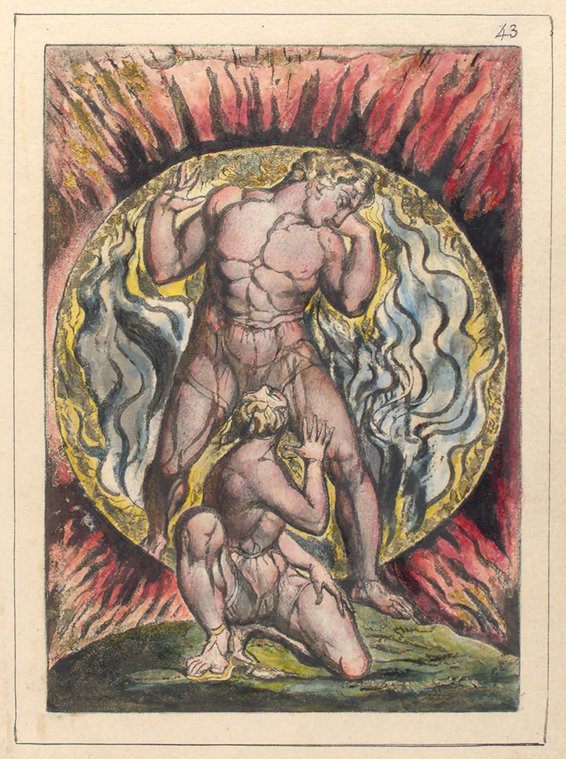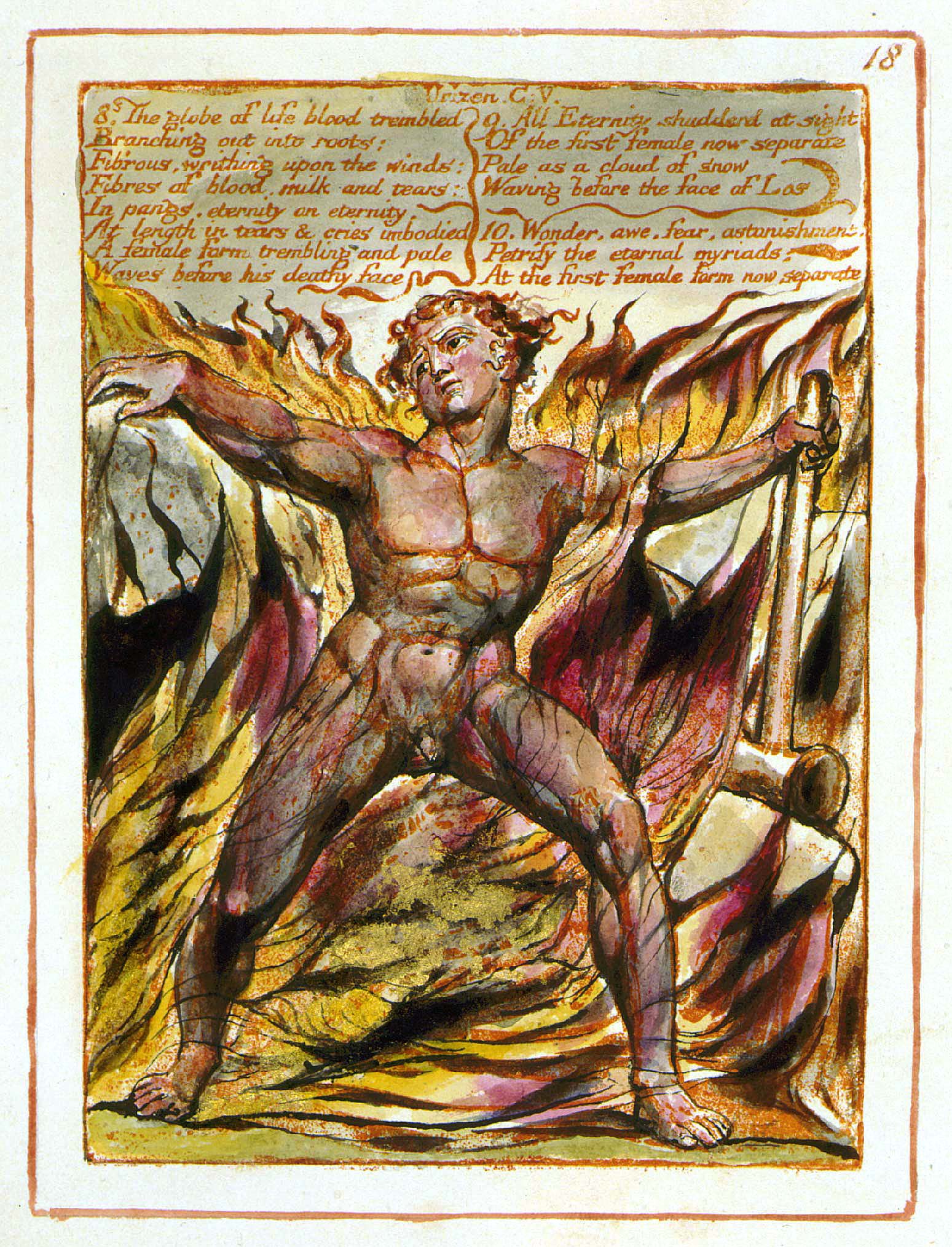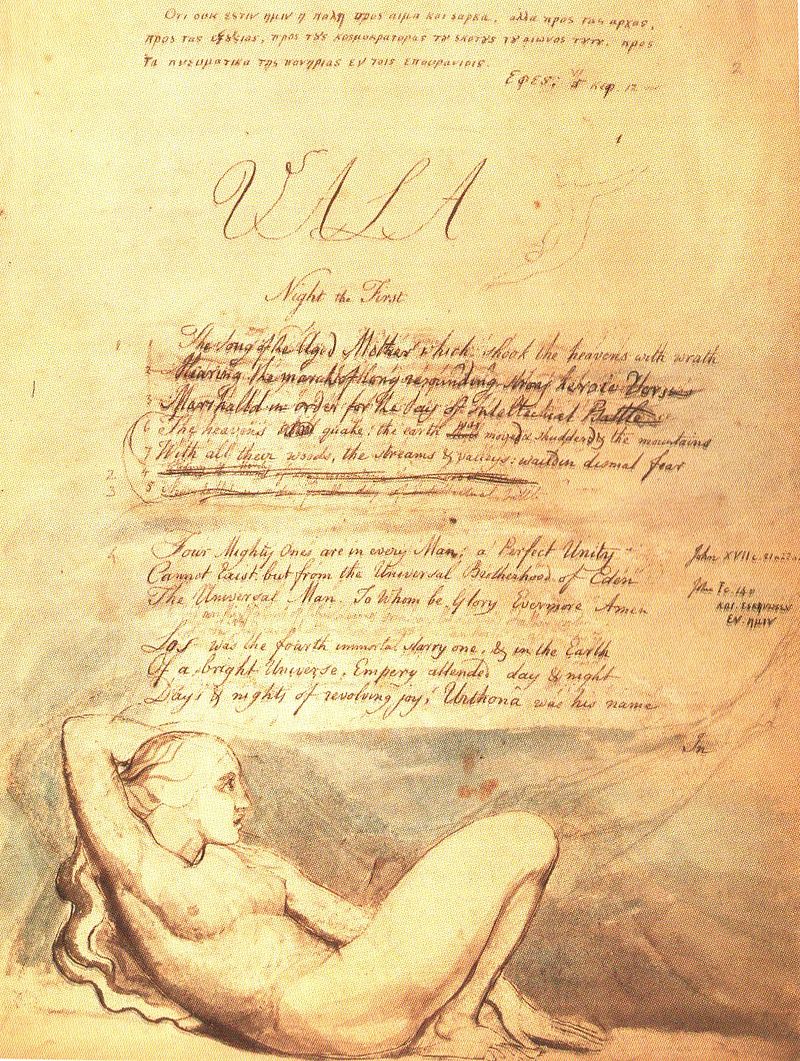 |
| British Museum Song of Los Copy A, Plate 8 |
Criminals I could not dare to take vengeance; for all things are so constructed
And builded by the Divine hand, that the sinner shall always escape,
And he who takes vengeance alone is the criminal of Providence;
If I should dare to lay my finger on a grain of sand In way of vengeance;
I punish the already punishd: O whom Should I pity if I pity not the sinner who is gone astray!
O Albion, if thou takest vengeance; if thou revengest thy wrongs Thou art for ever lost!
What can I do to hinder the Sons Of Albion from taking vengeance? or how shall I them perswade.
So spoke Los, travelling thro darkness & horrid solitude:"
Los was Blake's alter ego attempting those feats of physical, intellectual and spiritual achievement which Blake admired. Blake gave this dramatic account of becoming one with Los.
 |
| New York Public Library Milton Plate 43, Copy C |
"Tho driven away with the Seven Starry Ones into the Ulro
Yet the Divine Vision remains Every-where For-ever. Amen.
And Ololon lamented for Milton with a great lamentation.
While Los heard indistinct in fear, what time I bound my sandals
On; to walk forward thro' Eternity, Los descended to me:
And Los behind me stood; a terrible flaming Sun: just close
Behind my back; I turned round in terror, and behold.
Los stood in that fierce glowing fire; & he also stoop'd down
And bound my sandals on in Udan-Adan; trembling I stood
Exceedingly with fear & terror, standing in the
Vale Of Lambeth: but he kissed me and wishd me health.
And I became One Man with him arising in my strength:
Twas too late now to recede. Los had enterd into my soul:
His terrors now posses'd me whole! I arose in fury & strength."
 |
| Wikimedia Commons Urizen Copy G, Plate 18 |
"O why did foul ambition sieze thee Urizen Prince of Light
And thee O Luvah prince of Love till Tharmas was divided
And I what can I now behold but an Eternal Death
Before my Eyes & an Eternal weary work to strive
Against the monstrous forms that breed among my silent waves
Is this to be A God far rather would I be a Man
To know sweet Science & to do with simple companions
Sitting beneath a tent & viewing sheepfolds & soft pastures
Take thou the hammer of Urthona rebuild these furnaces
Dost thou refuse mind I the sparks that issue from thy hair
Page 52
I will compell thee to rebuild by these my furious waves
Death choose or life thou strugglest in my waters, now choose life
And all the Elements shall serve thee to their soothing flutes
Their sweet inspiriting lyres thy labours shall administer
And they to thee only remit not faint not thou my son
Now thou dost know what tis to strive against the God of waters
So saying Tharmas on his furious chariots of the Deep
Departed far into the Unknown & left a wondrous void
Round Los. afar his waters bore on all sides round. with noise
Of wheels & horses hoofs & Trumpets Horns & Clarions
Terrified Los beheld the ruins of Urizen beneath
A horrible Chaos to his eyes. a formless unmeasurable Death
Whirling up broken rocks on high into the dismal air
And fluctuating all beneath in Eddies of molten fluid
Then Los with terrible hands siezd on the Ruind Furnaces
Of Urizen. Enormous work: he builded them anew
Labour of Ages in the Darkness & the war of Tharmas
And Los formd Anvils of Iron petrific. for his blows
Petrify with incessant beating many a rock. many a planet
But Urizen slept in a stoned stupor in the nether Abyss"









